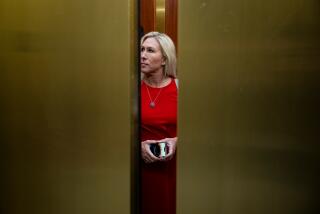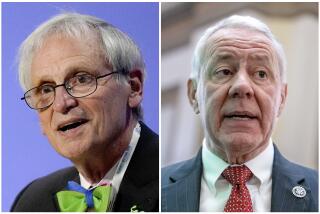PERSPECTIVE ON POLITICS : We Don’t Need a Whitewater Photo Op : Hearings would yield nothing; Clinton and Congress need to acknowledge their responsibility to govern.
- Share via
Can any member of Congress honestly say that decision-making in the White House will be improved, that systematic wrongs will be righted, that the American people will gain enhanced respect for their leaders or that any other gain will be achieved from holding hearings on the Whitewater affair? The idea of a “serious examination of the issues” by Congress brings a smirk to the face of anyone over 12 years old. Such is the result of media-driven politicians and scandal-driven media, which together dominate and corrupt the political process in our country today. My qualifications to offer objective comment may be in doubt; as a central figure in the Iran-Contra hearings, a bias would not be unexpected. I would only offer that I’m prepared to condemn both parties.
Time and again during the Iran-Contra hearings, there were examples of congressmen who had been kept well-informed--who knew everything I did about Ollie North’s activities--looking down at me from the dais, intoning with false gravity, questions to which they knew the answers, criticizing policies and actions for which they had been devoted advocates months before. Theater, pure theater.
We know what those hearings produced: a popular outpouring for North, the basis for his escaping successful prosecution; and no initiatives, laws or rules that hold any promise of preventing the same thing from happening again. Let’s face the facts, congressional hearings present opportunities for Congress to get on the evening news back home--period.
Scholars have identified the roots of our political decline over the past 30 years. They include loss of confidence among Americans in the very idea of “reposing special trust and confidence” in political leaders, which started with a President’s abuse of that trust during the Gulf of Tonkin episode and the Vietnam War. Popular mistrust of politicians deepened with episode upon episode of lying by public officials over the bombing of Cambodia, Watergate, congressional check-kiting and Iran-Contra.
The angry expressions of voter backlash to these events unfortunately, haven’t done much to help. The election after Watergate of a huge tide of young “reform-minded” congressmen who swept away the seniority system did more harm than good. So-called election reform gave us political-action committees, which have led to everyone having a voice in Washington except the majority of the people. The separate but related phenomenon of each legislator now having his or her own financial base has left the party leaderships and machinery much less powerful and much less able to deliver votes to a President or to a cause. It also gives a President less incentive to bother trying to engage with them if they can’t deliver.
In times of crisis, our country has been extraordinarily fortunate to have produced heroic leaders--men or women of vision and courage who were not susceptible to the temporary lure of political expediency. I’m convinced that those in office today are capable of doing the right thing.
What would be your reaction if the following events occurred?
Sen. Robert Dole engages privately in heart-to-heart talks with President Clinton. The larger point Dole would make would be that both men face only two choices. One choice is hearings, which will produce much confusion and one awful sentiment among Americans: that their leaders are playing political games again. The alternative is for the President to acknowledge errors. With a pledge from Dole to discontinue the push for hearings (probably with the President’s agreement to accommodate a few GOP legislative priorities), Clinton agrees to go before the people and lay everything out (to Dole’s satisfaction).
On the same day, Dole makes a statesman’s speech, recalling the aforementioned benchmarks of decline over the past generation and his wish to set a new course in our political discourse.
There was a time not so long ago when a President of one party--Dwight Eisenhower--could engage candidly with congressional leaders of the other--Lyndon Johnson and Sam Rayburn--and argue but in the end agree that they shared a responsibility to govern, not to engage in sustained playground fights with one another. The political upside of that kind of behavior--Dole’s and Clinton’s numbers would go way up immediately--is as clear today as it was then. But it does take courage to do the right thing.
More to Read
Get the L.A. Times Politics newsletter
Deeply reported insights into legislation, politics and policy from Sacramento, Washington and beyond. In your inbox twice per week.
You may occasionally receive promotional content from the Los Angeles Times.










